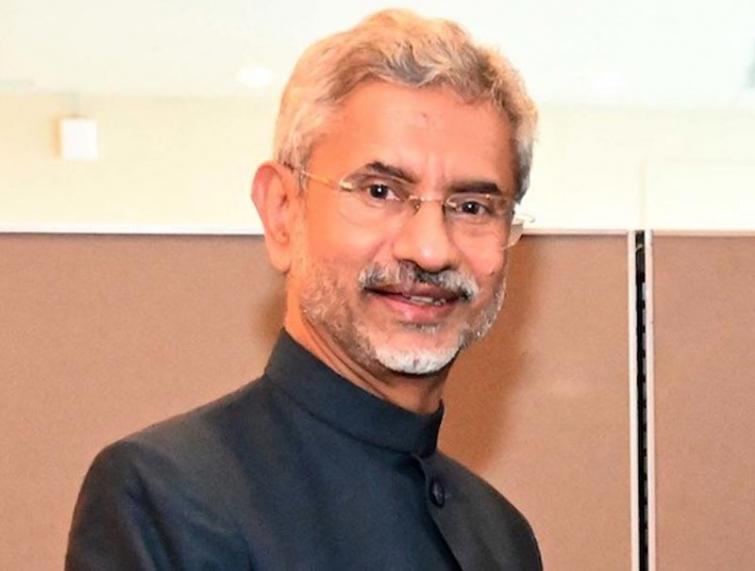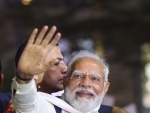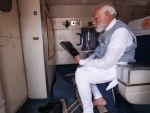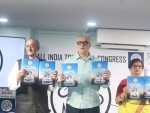
India can talk to Pakistan, but not Terroristan: S Jaishankar
New York: The problem at the core of Indo-Pak dialogue is Pakistan’s continuous use of terrorism to conduct its policies, External Affairs Minister S Jaishankar said in New York on Wednesday and clarified that India has no problem talking to Pakistan, but it has a problem talking to “Terroristan”.
Replying to a question on India’s move after Pakistan said a lot on the abolition of special status to J&K, Jaishankar said, “We have no problem talking to Pakistan, but we have problem talking to ‘Terroristan’..and they have to be the one and not be the other.”
“They have to accept the model they have built for themselves no longer works…you cannot in this day and age conduct policy using terrorism as the legitimate instrument of statecraft,” he maintained.
He asserted that Pakistan has built an entire industry of terrorism to deal with the Kashmir issue and its anger and frustration is due to the fact that its investment of 70 years on terrorism is going to be wasted if India’s new Kashmir policy works.
Jaishankar pointed out to the audience that Article 370 offered 'temporary special status' to Jammu and Kashmir, which is often overlooked by the international media. “Now, here's the funny thing. We rarely read that in the international press,” he said.
"We agree on what the word temporary means, it means something comes to an end. After 70 years, it came to an end. And 70 years is a decent definition of the word temporary," he said.
Pakistan reacted sharply after the revocation of Article 370 and sent back Indian High Commissioner.
Speaking about China’s reaction on abrogation of Article 370 and bifurcation of the state of Jammu & Kashmir into two union territories, he said China had misread India’s move, but nevertheless its reaction was different from that of Pakistan.
"We are sort of reformatting this within our existing boundaries. It obviously drew a reaction from Pakistan, it drew a reaction from China. These are two very different reactions. I think, for Pakistan, it was a country which has really created an entire industry of terrorism to deal with the Kashmir issue. In my view, it's actually bigger than Kashmir, I think they have created it for India," Jaishankar said.
“Now, I don't know why they believe that it impacted on them," he said, adding that he went to China few days after India made the change in its Constitution and explained to them "as far as they were concerned, nothing had changed. India's boundaries had not changed, the Line of Actual Control has not changed. So that was the conversation we had with them."
Jaishankar stated that over the years Article 370 had transformed from a bridge to a barrier and "actually created a sense of alienation, alienation to separatism, separatism used for terrorism."
He said after the Narendra Modi government was voted to power for the second term, it decided to take a stand for the development of Jammu and Kashmir.
"And the options were either we do more of the same, knowing it doesn't work, or we do something different. So I think the choice was okay, we will do something different. And that something different, by the way, has no implications for the external boundaries of India," he stated.
Asked what Pakistan should do as a precondition to start a dialogue on Kashmir, the minister said, “I think we are getting this wrong. First of all Pakistan has to do something for its own good and if it does that, it would enable a normal neighbourly relationship with India."
He pointed out that it is not that India and Pakistan share a cordial relationship and Kashmir is the only one issue. "We had an attack on Mumbai city. The last time I checked, Mumbai city was not a part of Kashmir. So if Pakistani terrorists can attack states and regions which are far removed from Kashmir, we have got to recognise that there is a bigger problem out there," the minister maintained.
He said the problem lies in Pakistan’s “mindset” and with every change in governance, "somebody says its new and nothing to do with the earlier guys" and passes off the blame to the previous regime.
Taking a jibe at Pakistan, he added, “Second, position, it has nothing to do with us as a country, it's all the Americans. The Americans taught us the bad habits by doing the Afghan jihad. We were good people till you came along,"
Emphasizing that terrorism was at the problem at the heart of Indo-Pak relation, he said, "There is a fundamental issue there which they need to understand and we need to encourage them to do - that is to move away from terrorism.”
"These are not activities which are subterranean. These are activities in broad day light. They know where the camps are, anybody knows where the camps are, just Google them. You'll find them," he added.
Support Our Journalism
We cannot do without you.. your contribution supports unbiased journalism
IBNS is not driven by any ism- not wokeism, not racism, not skewed secularism, not hyper right-wing or left liberal ideals, nor by any hardline religious beliefs or hyper nationalism. We want to serve you good old objective news, as they are. We do not judge or preach. We let people decide for themselves. We only try to present factual and well-sourced news.







